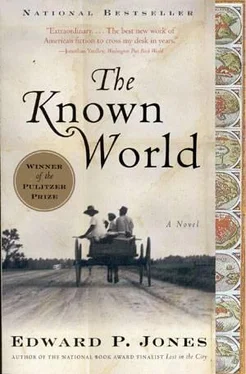Bennett took care of Skiffington’s horse and Zeddie led him into the parlor where Caldonia stood when he entered the room. He took off his hat and said, as he had at the funeral, that he was sorry about her husband.
“I don’t know where they could have gotten to,” Caldonia said. No one sat.
“I understand the Alice one wasn’t comfortable in her own head.”
“No, and Priscilla would no more leave this plantation than I would, sheriff.”
“How much were they worth?”
“Pardon?”
“How much were the three slaves worth? How much would you get if you were to sell them? On the market.”
“Oh, I don’t know. My husband would have known just like that, but I can’t say I kept up with such matters. I’m sorry.”
“It doesn’t matter very much. How long that overseer and her been married?”
“I’d say about ten years,” Caldonia said. It was the first time she had fully realized that she had been making love to another woman’s husband. Priscilla had always been there and yet she had been on the other side of the earth, married to a different man.
“Ten years is a long time,” Skiffington said. Caldonia said nothing but looked slightly puzzled. When he asked about Moses, she offered to have him brought to the house but he told her he would go out to meet him.
Heading to the fields, he remembered the slave man and woman in his office, the man being sold that day to William Robbins and the woman being sold days later to someone else. We are together, the slave man kept saying. We are one… He came to a small rise that led down to the fields and could not make out the overseer because he was not on a horse looking down, but was just one among the working slaves. He went down the rise and called out that he wanted to see Moses. Moses rose up from the furrow and made his way to Skiffington.
Moses took off his hat and said good morning to Skiffington and the sheriff said good morning.
“You know where they might be?”
“No, sir. I woke yesterday and they was gone, all three just gone.”
“Were they there when you went to sleep?” More and more of the day Moses was sold in the jail was coming back to Skiffington.
“Yes, sir. But that Alice tend to wander, bein not in one piece the way she was. No harm by that. No harm by all that walkin about and such like. And sometimes my Priscilla and Jamie would just go to keep her company. They thought the world of Alice.” Elias would put a lie to most of that on Skiffington’s second visit. Moses continued building a story that Elias and others would tear down with just a few questions from Skiffington.
Finally, Skiffington told him to go on back to work and Moses set his hat on his head and returned. Skiffington would not remember in a few days who told him that Moses and his mistress had supper-“just like some man and his wife be eatin”-just before the slaves disappeared. He would remember that no one would ever report seeing buzzards in the sky to evidence killing by wolves or bears. He became convinced that the three were dead and that someone had had to put the dead in the ground to deprive the buzzards. He watched Moses, who overcame the need to turn and look back at the sheriff, and Skiffington knew any slave would want to leave the field and never return. It was in watching Moses walk away that he began to suspect him of murder. He could not understand why until he heard he had had supper with Caldonia. But why kill when all that was required was for him to step out of the cabin door, wipe his hands clean of a wife and child, and step through the house door? And why hurt a child and a woman not of her own mind?
He watched as Moses went back to the row he had been in and picked up his bag and became one with all around him, the land and its bounty and the slaves leaning over and picking and stepping. The crows hovered above them. Skiffington could see that the birds were high enough to avoid a hand but not high enough to escape a thrown stone. Moses had looked him straight in the eye the whole time, not once blinking or looking away. There was a reason God had made telling the truth one of his commandments; lying had the power to be a high wall to hide all the other transgressions. Skiffington considered Caldonia. He had heard of that white woman in Bristol who had slept with her slave. Bad business. But what the coloreds like Caldonia and Moses did among themselves was no crime in itself. Killing a slave for no reason was always a crime, before man, before God.
Two days later, evening, Skiffington heard a commotion out on the street and came to see what it was.
”Hey, John,” Barnum Kinsey, the patroller, said from atop his horse, the old thing his father-in-law had given him. Even before he reached him, Skiffington could tell that Barnum had been drinking, and he had drunk a lot. It had been more than two weeks since Augustus Townsend had been sold back into slavery. Barnum’s wife had had many sorrows but she had never regretted marrying him.
“Barnum?” Skiffington said.
The dry goods merchant had been trying unsuccessfully to shoo Barnum away from in front of his establishment but now that Skiffington was there, he left to close up for the night. Once the merchant went inside, the street was empty except for the two men, the horse Barnum was on, Skiffington’s tethered horse and a dog across the street that had lost its way.
“Hey, John. Nice evenin, huh?”
“Not a bad one, Barnum. You headin home?”
“Yes, John, I reckon I will. Soon. But I do have my patrollin.” He was quiet for a time, and while he was the dog got up from its haunches and went west. “I wanted to tell you somethin, and I have been workin my mind so the words will tumble out in a straight line. You know how that can be, John.”
“I do, Barnum. Just set them words one by one and they’ll do fine and we’ll get where we got to go.”
“Harvey Travis and Oden Peoples took Augustus Townsend and sold him. Harvey ate his free papers up, and then he sold him away, John. Thas all there is to it.”
“Sold Augustus? When was this?”
“Days ago maybe. Maybe a week. Time and me not friends anymore so a day can be like a month. Or a minute.” Barnum belched and seemed to be sobering with each word he spoke. “Man’s name was Darcy, that slave speculator you told us to look out for. Sold him for more money than I see at one time. Sold his mule, too, John. Sold that man’s mule. Had niggers in the back that he was probably tryin to sell. No tellin who they belong to.”
“Tellin me sooner might have done some good, Barnum. Sellin a free man is a crime and you should be there to stop it.”
“I know, John. I know all about that. You ain’t tellin me nothin I don’t already know.” The dog came back and stood in the middle of the street, then looked around. It trotted east. Barnum belched again. He shifted in the saddle. “I wish I was braver, John. I wish I was as brave as you.”
“You are, Barnum, and one day people will know that.”
“I wonder. I wonder.” He leaned forward. “Now I don’t want you to take me tellin you all this as my becomin a nigger kisser or somethin like that. It ain’t that. You know me, John. But they sold that Augustus and they sold his mule.” It was twilight and the stars were quite evident in the sky. The moon, still low, was behind Skiffington and only Barnum could see it.
“I know you, Barnum.”
“But he was a free and clear man, and the law said so. Augustus never hurt me, never said bad to me. What Harvey done was wrong. But tellin you don’t put me on the nigger side. I’m still on the white man side, John. I’m still standin with the white. God help me if you believe somethin else about me.” He shifted in the saddle once more. The moon was just above the horizon now, a large, dusty orange point, but Barnum did not raise his head high enough to see it. “It’s just that there should be a way for a body to say what is without somebody sayin he standin on the nigger side. A body should be able to stand under some… some kinda light and declare what he knows without retribution. There should be some kinda lantern, John, that we can stand under and say, ‘I know what I know and what I know is God’s truth,’ and then come from under the light and nobody make any big commotion bout what he said. He could say it and just get on about his business, and nobody would say, ‘He be stickin up for the nigger, he be stickin up for them Indians.’ The lantern of truth wouldn’t low them to say that. There should be that kinda light, John. I regret what happened to Augustus.”
Читать дальше












